Profiles of Post Trauma Disorder
Post Trauma Disorder is “the Silent Killer”
A Decorated Veteran and Advocate Ends His Life
Soldiering on in Pain - a Prescription Drug Overload Led to Death
The Demons of War Persist - Post Trauma Disorder after the Trauma of War
Post Trauma Disorder (PTD) (formerly called Post–Traumatic Stress Disorder – PTSD) is the result of trauma from natural disasters and other catastrophic events. PTD has devastating effects and no one is immune. And it can affect families for generations.
The Post Trauma Disorder conditions and suffering described in the following three articles were experienced by U.S. veterans of the Gulf War and the conflict in Viet Nam.
The PTD symptoms experienced by these three individuals as the same as symptoms that follow trauma due tp natural disasters and other catastrophic events.
As a result millions of individuals around the world have PTD that is not being diagnosed or properly treated. Prescription drugs are over-used and can act in dangerous and tragic ways. New drug–free approaches, however, are available and PTD can be successfully treated with safe and cost–effective technology. Dr. Gay Larned, Ph.D.
The Post Trauma Disorder conditions and suffering described in the following three articles were experienced by U.S. veterans of the Gulf War and the conflict in Viet Nam.
The PTD symptoms experienced by these three individuals as the same as symptoms that follow trauma due tp natural disasters and other catastrophic events.
As a result millions of individuals around the world have PTD that is not being diagnosed or properly treated. Prescription drugs are over-used and can act in dangerous and tragic ways. New drug–free approaches, however, are available and PTD can be successfully treated with safe and cost–effective technology. Dr. Gay Larned, Ph.D.
_____________________________________________________________________
The first article is about a decorated U.S. veteran who locked himself in his room and shot himself. He shouldn’t have died. Post Trauma Disorder (PTD) (formerly called Post–Traumatic Stress Disorder) killed him along with tens of thousands of individuals like him each year – men and women, veterans and civilians – because they are not properly diagnosed and successful treatment is not available.
A Decorated Veteran and Advocate for Better Healthcare
for Veterans Kills Himself after Two Tours of War
by
Kimberly Hefling
Associated Press
April/15/2011
for Veterans Kills Himself after Two Tours of War
by
Kimberly Hefling
Associated Press
April/15/2011
xxx
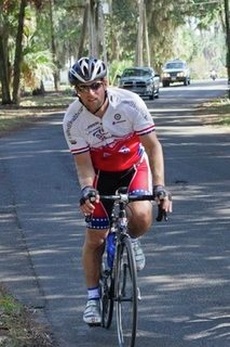
Handsome and friendly, Clay Hunt so epitomized a vibrant Iraq veteran that he was chosen for a public service announcement reminding veterans that they aren't alone.
The 28-year-old former Marine corporal earned a Purple Heart after taking a sniper's bullet in his left wrist. He returned to combat in Afghanistan. Upon his return home, he lobbied for veterans on Capitol Hill, road-biked with wounded veterans and performed humanitarian work in Haiti and Chile.
Then, on March 31, Hunt bolted himself in his Houston apartment and shot himself.
Friends and family say he was wracked with survivor's guilt, depression and other emotional struggles after combat. Hunt's death has shaken many veterans who served in Iraq
The 28-year-old former Marine corporal earned a Purple Heart after taking a sniper's bullet in his left wrist. He returned to combat in Afghanistan. Upon his return home, he lobbied for veterans on Capitol Hill, road-biked with wounded veterans and performed humanitarian work in Haiti and Chile.
Then, on March 31, Hunt bolted himself in his Houston apartment and shot himself.
Friends and family say he was wracked with survivor's guilt, depression and other emotional struggles after combat. Hunt's death has shaken many veterans who served in Iraq
Clay Hunt, like most who suffer from Post Trauma Disorder (PTD) (formerly called Post–Traumatic Stress Disorder – PTSD), felt he could not speak about his pain. Clay’s greatest pain was something called “survivor’s guilt”. When he came home from the Gulf wars he became exhausted from on–going remorse about those who didn’t return.
Hunt's death has shaken many veterans who served in Iraq and Afghanistan. Those who knew him wonder why someone who seemed to be doing all the right things to deal with combat-related issues is now dead.
The photo above, taken in November 2010, provided by Ride 2 Recovery, shows Clay Hunt. was a vital young man who had everything in life to look forward to.
To read the rest of this article please go to:
http://mydeathspace.com/article/2011/04/16/Former_Marine_Clay_Hunt_%2828%29_after_a_battle_with_Post_Traumatic_Stress_Disorder.
TIP: Check to see if a pop-up might be blocking access to the hyperlink and then click on it to allow access.
Hunt's death has shaken many veterans who served in Iraq and Afghanistan. Those who knew him wonder why someone who seemed to be doing all the right things to deal with combat-related issues is now dead.
The photo above, taken in November 2010, provided by Ride 2 Recovery, shows Clay Hunt. was a vital young man who had everything in life to look forward to.
To read the rest of this article please go to:
http://mydeathspace.com/article/2011/04/16/Former_Marine_Clay_Hunt_%2828%29_after_a_battle_with_Post_Traumatic_Stress_Disorder.
TIP: Check to see if a pop-up might be blocking access to the hyperlink and then click on it to allow access.
_____________________________________________________________________
Like Clay Hunt, Chad Oligschlaeger shouldn’t have died. Combat conditions experienced by U.S. service men and women in the Persian Gulf wars have never been seen in prior wars. Head injuries, the trauma from constant bombardment of IEDs (Improvised Explosive Devices), and the strain of multiple deployments have created an epidemic of chronic Post Trauma Disorder (PTD) (formerly called Post–Traumatic Stress Disorder– PTSD). Chronic PTD is defined as symptoms of PTD lasting longer than 90 days. PTD is present among the majority of those who are in combat and those who return. Many service people overseas have battered minds that cannot heal, and when they return home many are unable to re–enter their lives. Prescription drugs are increasingly used for PTD with devastating results for individuals and their families.
Soldiering On In Pain - A Prescription Drug Overload Led to Death
by
David Olinger and Erin Emery
The Denver Post
August 26, 2008
xxx
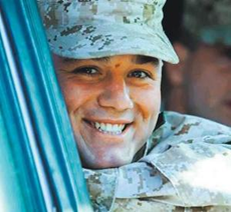
Chad Oligschlaeger "was completely different" when he returned from his first tour in Ramadi, Iraq, in 2006, his mother, Julie, said. He was 19, but "he looked older. He was drinking. At night he told me horrific stories. Then he'd go to bed, and I'd just sit there and cry."
The Strain of Duty Surfaces
Military officials say there is no way to track how much pain and behavioral medication is being consumed by soldiers at war in Iraq and Afghanistan, in part because soldiers and military doctors often bring medication from home when they're sent overseas.
The Strain of Duty Surfaces
Military officials say there is no way to track how much pain and behavioral medication is being consumed by soldiers at war in Iraq and Afghanistan, in part because soldiers and military doctors often bring medication from home when they're sent overseas.
xxx
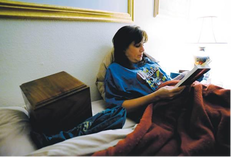
Julie Oligschlaeger, mother of Chad, sits in bed with her son’s urn at her side.
Annual surveys by a military mental health advisory team, however, have asked soldiers whether they have taken medicine for mental health, combat stress or sleep problems. The number who said yes jumped from 8% in 2004 to 14% in 2005, and then dipped to 12% in 2006. Last
year, one in eight soldiers surveyed in Iraq and one in seven in Afghanistan said they had taken sleeping pills or antidepressants.
To red the rest of this article please go to:
http://www.denverpost.com/previous2/home/ci_10302929.
TIP: Check to see if a pop-up might be blocking access to the hyperlink and then click on it to allow access.
Annual surveys by a military mental health advisory team, however, have asked soldiers whether they have taken medicine for mental health, combat stress or sleep problems. The number who said yes jumped from 8% in 2004 to 14% in 2005, and then dipped to 12% in 2006. Last
year, one in eight soldiers surveyed in Iraq and one in seven in Afghanistan said they had taken sleeping pills or antidepressants.
To red the rest of this article please go to:
http://www.denverpost.com/previous2/home/ci_10302929.
TIP: Check to see if a pop-up might be blocking access to the hyperlink and then click on it to allow access.
_____________________________________________________________________
The extract below is from the award winning book Looking for God within the Kingdom
of Religious Confusion, by A.W. Schade, United Marine Corps, Marine, Vietnam 1966 - 67.
It is one of the best dramatic descriptive narratives about the crippling effects
of Post Trauma Disorder. It is reproduced here with the permission of Mr. Schade,
who wrote: "If this story can help one person break the stigma of PTSD to seek help,
instead of suicide, or a life of destitution, please pass it on.” January 201.
The Demons of War are Persistent: Post-Traumatic Stress Disorder -
the Aftermath of the Trauma of War
January 2011. A.W. Schade; US Marine, Vietnam 1966/67, retired corporate
executive and author of the award winning book; Looking for God within the Kingdom
of Religious Confusion.
of Religious Confusion, by A.W. Schade, United Marine Corps, Marine, Vietnam 1966 - 67.
It is one of the best dramatic descriptive narratives about the crippling effects
of Post Trauma Disorder. It is reproduced here with the permission of Mr. Schade,
who wrote: "If this story can help one person break the stigma of PTSD to seek help,
instead of suicide, or a life of destitution, please pass it on.” January 201.
The Demons of War are Persistent: Post-Traumatic Stress Disorder -
the Aftermath of the Trauma of War
January 2011. A.W. Schade; US Marine, Vietnam 1966/67, retired corporate
executive and author of the award winning book; Looking for God within the Kingdom
of Religious Confusion.
zzz
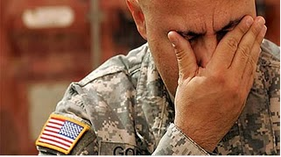
Some manage the Demons onslaught successfully. Others ignore the stealth domination of their soul. Many consider themselves cowards, should they acknowledge the Demons existence. Countless live in denial and loneliness; protecting a warriors pride. Millions survive in destitution, or find solitude through social disconnection.Sadly, many interweave within these emotional conflicts throughout their lifetime, attempting to fight the Demons' alone. As the most vulnerable, too often, choose to ‘end’ their lives, tormented by guilt, and forever alone.
Prelude
Forty years have passed since my deployment as a combat Marine in Vietnam. Like many Veterans of war, the 'Demons' have persisted to haunt me over a lifetime of tears, altered persona, and secretive fears. The purpose of this story is to help Veterans of all eras recognize, there is no longer a need to fight the 'Demons of War' alone. Today, the Veterans Administration and civilian medical communities understand the psychological transformation that haunts Veterans of war. It is no longer a dishonor, nor are you less of a warrior if you seek medical assistance from within or outside the Military.
It has taken me more than two years to complete this personal message. It forced me to muster memories of my past, albeit grudgingly, and glance back through the cloak of shadows I have fought alone for so many years. Therefore, please take a few minutes to read this story - before your future becomes a reflection of mine, and thousands of other Veterans past. For the 'Demons of War' will intensify in your mind, and if not confronted early their determination to control your way of thinking will persist throughout your lifetime. Until, they eventually imprison your soul.
The Demons of War are Persistent
Friends and family gather to celebrate another joyful holiday. Nonetheless, encircled in the cheerful atmosphere I am often melancholy, as vivid memoriesof lost friendships and battlefield carnage randomly seep from the vulnerable partition of my mind; a secret place I concocted decades ago to survive in society. Thoughts I silently struggle to keep inaccessible for fear of unleashing the worst of war's nightmares,which continue to blockade my endeavors to reminisce of the innocence and joy of my adolescence and pre-war past.
Although this story is of one warrior, it pertains to countless more (individuals who have suffered trauma). For entrenched within our spirit, humanity has sought expedient motives to send the young to war; and my pledge to God, Country, and Marine Corps was Forty years ago, or more. At eighteen, like many others, I encountered the timeless stench of death and carnage, in the jungles of Vietnam. But as a young unproven warrior, I consented willingly to the ancient rules of war. Too naive to realize, the twisted demons' had already begun a lifelong quest for the possession of my soul.
My journey began as many others, a bus ride to New York's legendary Induction Center at 39 White Hall Street. We went through lines of examinations, and stood around for hours. We had no choice but notice one another's bare asses, before we had the chance to learn each other's name. Nor did we know so many of us would remain together, building deep-seeded bonds of friendships through Parris Island, Camp Pendleton, Okinawa, to the deadly battles in the theatre of war - Vietnam.
We argued and fought among ourselves, as brothers often do. Yet, we never lost sight of the bonds we had as friends, United States Marines, and the indisputable commitment we lived by, to always 'cover each other's back'.
Aware of our destination we partied hard in every port, covering each other's back in countless bar room brawls. In confidence, we spoke about our hardships, growing-up, family, girlfriends, and future plans. As well, the dreams of going home again and the years of lasting friendships we faithfully agreed to share.
We transferred to a converted WWII aircraft carrier, which carried helicopters not jet planes, to transverse the coast of Vietnam to deploy by helicopter into combat zones from the DMZ, DaNang and the outer fringes of Saigon.
Within sight of land, we heard the roar of artillery and the familiar crackling of small arms fire. We loaded into helicopters to descend into the confrontation. With ambivalence, we assured ourselves that we were young, invincible warriors eager to engage in the battle. Indoctrinated in training, we knew the South Vietnamese people needed us, as we found many of them did. Our mission was to save the lives of the innocent and banish the enemy into Hell.
The helicopters plunged from their soaring formation to hover a few feet off the ground where we nervously leapt, some fell, into the midst of heated battle. The enemy was ready and sprung a deadly assault upon us. I was unaware that was the moment my psyche began to change, as I became engrossed in the shock, fear and 'adrenaline rush' of battle.
It was surreal! Nevertheless, not the time to ponder the finality of killing another human being, the sight of friends shot dead, the rationale behind the illusionary ethics of war, or absorbing the inherent fury of men slaughtering one another. Nor was it time to grapple with the thoughts of demon seeds being sown.
When the killing ceased and the enemy withdrew, I remained motionless, exhausted from the fighting. With only a moment to think about what occurred, shock, hate and anger surrendered to the gratitude of being alive. However, time was not a luxury. I had to find out which brothers did or did not survive. As I turned to view the combat zone, I witnessed the reality of war; dreams, friendships and plans are fleeting thoughts for combatants.
We knelt beside our brothers, some dead, many wounded and screaming in pain - while a few lay silently dying. As I moved about the carnage, I noticed a lifeless body, face down, and twisted abnormally in jungle debris. I pulled him gently from the tangled lair, unaware of the warrior I had found. Masked in blood and shattered bones, I was overwhelmed with disgust and primal obsession for revenge, as I realized the warrior was my mentor, hero and friend.
I shouted at him, as if he were alive: "Gunny you can't be dead, you fought in WWII, and Korea. Wake up! Wake up Marine; I need you to fight beside me!" Tears flowed down my face as I held him close and whispered he would not be forgotten. I placed him gently in a "body bag", and slowly pulled the zipper closed above his face, engulfing him in darkness.
Our extraordinary brothers, Navy Corpsmen, worked frantically to salvage traumatized bodies. We did our best to ease the pain of the wounded, as they prayed to "God Almighty". "With all my heart I love you man," I told each friend I encountered. However, some never heard the words I said, nor aware of the survival guilt inside me.
When our mission was completed, we flew by helicopter from the jungle to safety on the ship. Yet, none of us rested; we stayed up most of the night remembering faces and staring at empty bunks of the friends who were nowhere. I prayed the sun rose slowly to delay the forthcoming ceremony of the dead.
Early the next morning we stood in military formation on the aircraft carrier's deck; temporarily suppressing my emotions as I stared again upon the dead. Rows of military caskets, identical in design with an American flag meticulously draped over each of them, made it impossible to distinguish which crates encased the closest friends of mine.
As TAPS played tears descended unrestrained upon my face, and for the first time I understood, I did not have the chance to say goodbye. I pledged speechlessly to each of them that they would never be forgotten: A solemn promise I regretfully failed to keep, except through years of nightmares or hallucinations.
Combat is vicious, rest is brief, but destroying the enemy was our mission. We fought our skillful foes in many battles, until they or us, were dead, wounded, or withdrew when overwhelmed.
Engaging enemy troops in formidable battles was horrific. Even so, memories of 'guerrilla' warfare in jungles and villages were equally, if not more, agonizing to accept or build psychological boundaries around them [the trauma].
Nonexistent lines of demarcation, the constant struggle to identify which Vietnamese were friend or foe, and the tormenting acknowledgement that a woman or child might be an enemy combatant that had to be dealt with accordingly, was often overwhelming.
Weary, I was not aware of the progressive change in my demeanor. In time, I thought I adjusted emotionally to contend with the atrocities and finality of war. I acquired the stamina to endure the stench of death, eliminate enemy combatants with little or no remorse, suppress memories of fallen companions, shunned forming new deep-rooted friendships, and struggled to accept the feasibility of a loving Lord.
I fought proudly alongside unacknowledged heroes, and led others into battle.Yet, never detected the nameless demons, embedding themselves inside me.
My tour of duty complete, I packed minimal gear and left the jungle battlefields of Vietnam for America. Never turning to bid farewell or ever again wanting to smell the pungent stench of death and fear. Within seventy-two hours, I was on the street I left fourteen months before; a street untouched by war, poverty, genocide, hunger or fear. I was home - yet, alone. Aged psychologically beyond my 19 years and emotionally confused,I had to adjust immediately from a slayer, to a so-called civilized man.
Except for family members and several high school friends, returning home from Vietnam was demeaning for most Veterans. There were no bands or cheers of appreciation from the country, so many gave their lives to serve. Instead, many were shunned and ridiculed for fighting in a war that our government assured us was a crucial and honorable cause.
As well, family, friends and often myself, never truly understood the changes that transformed me in fourteen months from a teenage boy, to a battle hardened man.
I was not able to engage in trivial conversations, nor take part in adolescent games many friends still played. For them, life did not change and the realism of struggle was a job, or the unbearable pressure of college they claimed they had to endure. It did not take long to realize they would never understand, there is no comparison between homework, and carrying a dead or dying man.
The media played their bias games, downgrading the military and never illuminating the thousands of Vietnamese saved from mass execution, rape, torture, or other atrocities of a brutal Northern regime. Nor, did they highlight the stories of American 'heroes' who gave their lives, shattered bodies and emotional self-sufficiency to save innocent people caught in the clutches of a controversial war.
For years, my transition back to society was unclear, asI struggled against unknown demons, and perplexing social fears. I abandoned searching for surviving comrades or engaging in conversations of Vietnam. Moreover, I fought alone to manage recurring nightmares, in a cerebral chamber I code-named - "Do not open, horrors, chaos and lost friends from Vietnam."
However, suppressing dark memories is often not to be. As random sounds, smells, or even words unleash nightmares, depression and seepage of the bitterness, I still fight to keep locked inside me.
Today, my youth has long since passed me by and middle age is drifting progressively behind. Still, unwelcome metaphors and echoes of lost souls seep through the decomposing barrier I fabricated in my mind; so many years before. Vivid memories of old friends, death, guilt and anger, too often persevere.
No end, no resolution, nor limitations to a time, demon voices that began as whispers, have intensified over decades in my mind. "Help me buddy!" I still hear them scream, as nightmares joust me from my slumber. I wake and shout, "I'm here! I'm here my friend", and once more envision their ghostly, blood soaked bodies.
Even today, I wonder if more Marines would be alive, had I fought more fiercely to reach them, before so many of them died. "I had to kill!" I tell myself, as visions of lost friends and foe hauntingly reappear at inappropriate times. Guilt consumes my consciousness as I question why I had, and they did not survive. More dreadful, however, is the conflicting torment I feel when I acknowledge to myself - I am thankful it was others, and not I.
This story has one purpose, to extend a helping hand.Regardless of the war you fought, your memories are similar to mine, and mine to yours. I never recognized how suddenly the demons had matured. Disguised and deep-rooted,I assumed anxiety, loneliness, depression, alcohol abuse, nightmares and suicidal thoughts, were traits that haunted every man [any one after trauma].
To all past and current warriors, I rise and applaud your valiant stand. Nonetheless,to control War's demons takes time, and the battle is much harder should you challenge them alone.
So do not wait to seek medical assistance, as older Veterans had to do. For far too many warriors were less fortunate than me, and even you.
PTD [Post Trauma Disorder] is real my friends, and easily recognizable. Yet, if not confronted early, can ruin relationships with your spouse, children, family, and career.
Remember, you will always be warriors and heroes to us all. But many will be overpowered by the demons’, and lose ownership of their soul!”
It is up to you to win this battle, as I know many of you will. Only this time family, friends, VA, outside professionals, or peer groups ‘will have your back’!
Semper Fi!
xxx
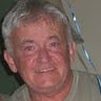
January 2011. A.W. Schade; US Marine, Vietnam 1966/67, retired corporate executive and author of the award winning book; Looking for God within the Kingdom of Religious Confusion. Mr. Schade can be contacted at awschade@gmail.com or.
Reproduced by permission of A. W. Schade
Reproduced by permission of A. W. Schade